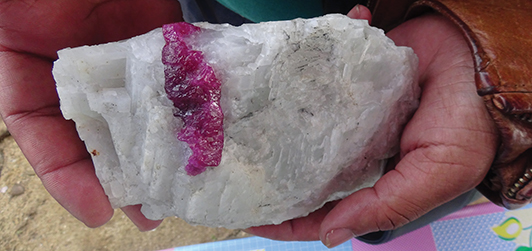|
Colored Gemstone
Myanmar Rubies Return to U.S.
The lifting of trade sanctions against Myanmar now allows prized rubies to enter the U.S.
By Sheryl Jones
 |
| A piece of ruby rough. |
The relationship between Myanmar — formerly known as Burma — and the gem industry in the U.S. is beginning again in a great spirit of cooperation and collaboration. Sanctions against the import of Myanmar ruby and jade were lifted after President Obama normalized relations with Myanmar on October 7, 2016. Americans will now have access to one of the most sought-after gemstones in the world. The gems will be mined and exported in accordance with a code of ethics and laws in Myanmar to protect miners and the public.
The first sanctions against Myanmar began in 1997 as a result of human rights violations. The JADE Act of 2008 specifically prohibited the import of ruby and jadeite mined or extracted from Burma. Tensions began to ease between the nation and the rest of the world in November of 2015, when Myanmar held free elections and Aung San Suu Kyi was elected as the country’s state counselor. In September 2016, she met with President Obama to discuss the efforts made toward democratic transition, which helped influence the decision to lift sanctions.
Before lifting sanctions, the American Gem Trade Association (AGTA) reached out to the U.S. State Department about AGTA doing an assessment of the Myanmar gem sector and the progress made in its young democracy. It was agreed that such an effort would be vital to the industry both in Myanmar and the U.S. AGTA put together a U.S. delegation representing the spectrum of the American jewelry industry. The purpose was to examine the gem sector and hopefully inform the Myanmar government of the changes since the eight years of sanctions. The delegation led by Jeffrey Bilgore AGTA president also included Douglas Hucker AGTA CEO, David Bonaparte president & CEO, Jewelers of America (JA); Dr. James Shigley head research scientist, Gemological Institute of America (GIA); and Timothy Haake, special counsel to JA.
YOU MUST HAVE JAVASCRIPT ENABLED TO VIEW THE SLIDESHOW
The lifting of the ban is great news to small gem dealers in the U.S. and businesses in Myanmar. Industry insiders say those firms were most affected because people could still buy rubies and jade in other countries that did not have sanctions, giving them a competitive edge. The U.S. renewed the ban in 2011, but the EU lifted its bans on ruby and jade in 2012, making it legal to buy those gems.
Now that it is legal to buy rubies and jade from Myanmar in the U.S., a few dealers already have those stones and more goods will be available at gem shows in 2017. Industry insiders believe prices will not be affected by this change because the rest of the world had access to the rubies and jade and the rarity of these stones will keep the prices at a premium. But they add that the market will seek its own level.
The industry in Myanmar was also very interested in creating added value to their ruby and jade market by cutting stones in the country before export. Typically, rough is exported and cut elsewhere. Myanmar gem industry leaders felt that discussions about the GIA providing education and a lab were key elements in plans to keep the youth engaged in the market and to create a larger industry there.
Bilgore says the delegation also suggested separating jade and ruby into two industry sectors based on where each is mined. “China has a very large influence in the area where jade is mined and 95 percent of it goes to that market,” he adds.
Bonaparte believes that the government can establish laws reflecting the code of ethics and criteria the delegation discussed well within two years. Bilgore concludes, “ I can’t wait to go back to meet industry leaders again and discuss the next steps. After our assessment we hoped to show that the Myanmar gem market was as worthy as any other and that the government has made significant progress in developing a democracy after so many years of military rule. All of this was proven totally true.”Article from the Rapaport Magazine - December 2016. To subscribe click here.
|
|